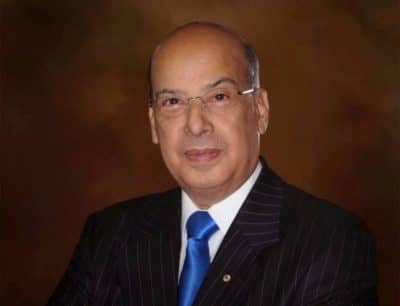
By Sir Ronald Sanders
(The writer is Antigua and Barbuda’s Ambassador to the United States and the Organisation of American States. He is also a Senior Fellow at the Institute of Commonwealth Studies at the University of London and at Massey College in the University of Toronto. The views expressed are his own)
A curious double standard is being applied by the Bank of Nova Scotia (BNS) by its decision to sell its operations in 9 Caribbean countries to Republic Financial Holdings Limited (RFHL) of Trinidad and Tobago.
In Canada, banks cannot be sold to foreigners without the expressed approval of the Government of Canada. The Canadian banking act is quite specific in two relevant areas.
First, no bank or bank branch can carry on business in Canada without obtaining the approval of the Finance Minister and the Office of the Superintendent of Financial Institutions (OFSI). This is especially important in the context of the Prime Minister and Minister of Finance of Antigua and Barbuda, Gaston Browne, insisting that his Government’s agreement is required before BNS can sell its Antigua holdings to RFHL or any other potential buyer.
Second, while the Canadian OSFI assesses applications for the incorporation of banks and makes recommendations to the Finance Minister, it is the Minister who has the ultimate responsibility for approving the incorporation of banks and foreign bank branches. Importantly, in discharging responsibility to approve a bank, an important consideration is whether such approval is in the “best interests of the Canadian financial system”.
Despite these existent circumstances in Canada, BNS is attempting to sell its holdings in 9 Caribbean jurisdictions without consultation with, or approval from, the Governments concerned.
Clearly, while a standard exists, and is operated, in Canada with respect to Government approvals, BNS appears to be expecting the 9 Caribbean countries to accept a lower standard. Those nine countries are: Anguilla, Antigua and Barbuda, Dominica, Grenada, Guyana, St Kitts-Nevis, St Lucia, St Maarten, and St Vincent and the Grenadines.

In the case of Guyana, both the Governor of the Central Bank, Dr Gobind Ganga, and Minister of State, Joseph Harmon, have stated that should the sale of BNS’ holdings be sold to RFHL, which already has a presence in the country, the latter would own at least 53% of total assets in the banking sector and more than 50% of total deposits. That situation troubles Opposition Leader and former President, Bharrat Jagdeo, as much as it worries the government since RFHL would be able to exert control over interest rates and lending policies.
The Government of Antigua and Barbuda’s resistance to sale of BNS’ holdings in Antigua to RFHL is different, but equally important.
Like every other Caribbean country, Antigua and Barbuda’s financial services sector has been subject to a process of ‘de-risking’ by which global banks in the United States, the UK and parts of Europe have withdrawn correspondent banking relations (CBRs). CBRs are vital to bank transactions. Without them, bills for goods and services incurred overseas cannot be settled, and monies for goods and services, earned from overseas cannot be received. In other words, CBRs are crucial to the Caribbean’s participation in the global financial and trading system. Without them, economies would wither, companies would collapse, and unemployment and poverty would rise.
In part, the domestic banking sectors in Antigua and Barbuda, and other Eastern Caribbean countries, have lost CBRs, and could lose more, because they are regarded as too small and not capable of producing enormous profits that would compensate global banks for ‘risking’ continued operations in their countries.
This is one of the reasons given by BNS for disposing of its operations in the nine countries. BNS said, “these transactions are not material to Scotiabank” which is “trying to shed regulatory burdens”. These burdens, incidentally, are imposed by the Organisation for Economic Cooperation and Development and the Financial Action Task Force, both external to the Caribbean.
By calling for BNS to sell its Antigua holdings to a consortium, comprising the Government and local banks, the Antigua and Barbuda Government says it is seeking “to strengthen the local banking sector, improve its resilience, and enhance the nation’s utilization of its own wealth, including keeping profits at home for re-investment in economic growth and social development”.
A sale of BNS’ holdings in Antigua to RHFL would not achieve the objective of enlarging the indigenous banks and increasing their capacity, making them more attractive for global banks to continue to provide CBRs. Indeed, for Antigua and Barbuda and other Eastern Caribbean countries, the situation would worsen since they would lose BNS’ built-in CBRs with its headquarters in Canada; their indigenous banks would not be strengthened; and they would be faced with another bank (RHFL) which requires CBR’s to conduct business.
Therefore, the Antigua and Barbuda concern with enlarging the capacity of its indigenous banks and enhancing their resilience is a legitimate concern in the best interest of its financial system.
There is a further consideration. In none of the 9 jurisdictions, which BNS calls “non-core markets” for its business, is anything more than branches being sold. BNS is not selling the Scotia brand or any association with Scotiabank, so ‘goodwill’ is questionable. It is selling assets and liabilities of a branch.
In this connection, it is important to note that the Antigua branch is not capitalised, and figures available in the auditor’s (KPMG) statement of 8 January 2016, reveal that EC$59.41 M was transferred to head office. Further, in 2017 the branch declared profits of EC$28.24 M, but listed EC$30.2 M as “due to Head Office”, leaving retained earnings in 2017 of EC$4.785 M, down from EC$6.521 M in 2016. All of this seems to suggest that the Antigua branch has been transferring the bulk of its retained profits to BNS’ Head Office.
BNS operated in Antigua for over 50 years. It derived all the money to meet its costs and make yearly profits that it transferred to its headquarters in Canada from clients in Antigua and Barbuda; none of that money, except for the initial small capital expenditure, many decades ago, came from outside. To the very end, it transferred relatively large profits made in the small Antigua and Barbuda market to its parent company.
Surely, in its desire to leave “to focus the Bank’s efforts on markets with significant scale”, BNS should recognise a moral obligation to sell its Antigua holdings to local entities, giving the country’s financial sector a chance to thrive.
Responses and previous commentaries at: www.sirronaldsanders.com
Advertise with the mоѕt vіѕіtеd nеwѕ ѕіtе іn Antigua!
We offer fully customizable and flexible digital marketing packages.
Contact us at [email protected]
















I agree 100% with Sir Ronald on this one. Antigua needs it’s own banking system and owned banks. Also, it’s time for us to have closer banking relationships with Asian countries. The USA and the EU want to destroy Antigua’s banking system.
Unless and until banks in the Caribbean elevate their Anti-Money Laundering & Countering of Terrorist Financing to the same level of Banking Best Practices that is practiced by compliance officers at North American or UK banks, international banks will engage in De-Risking, for risk purposes. Otherwise, Caribbean banks will continue to bank narcotics profits, money stolen by government officials, and other illicit capital, and onshore banks can no longer assume the risk of receiving what is most likely dirty money from Caribbean banks.
To suggest that the US is better at policing AML than the EC Caribbean region is to simply ignore the expert findings which show the US is not as great as you wish to fool persons into thinking. Boss, Dominica (4.17) who you enjoy attacking, got a better score (ML/TF risk) in the 2018 FATF ranking (Basel AML Index 2018) than the USA (5.00) you enjoy defending. Fact is the US has worsened in comparison to 2017 (+.50). GRENADA (4.20), ST. VINCENT AND THE GRENADINES (4.46), St. Lucia (4.48) also got better scores than the USA. Interestingly the stated islands got better scores than even Trinidad (5.25) where Republic bank is based. Tellingly TNT has shown a (-1.5) improvement in comparison to 2017. Yet watch you, the proverbial pot calling the kettle black,spreading your ignorance online.
Comments are closed.